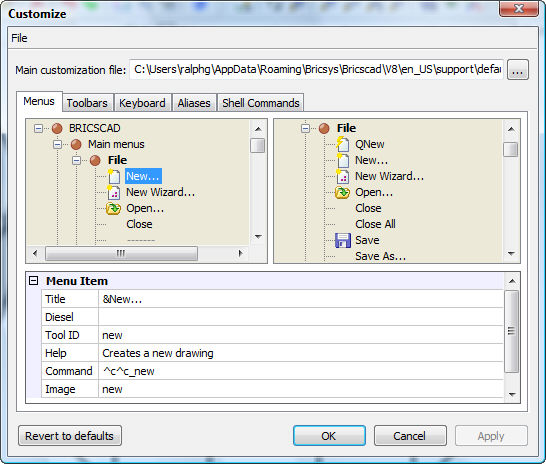
Works with Bricscad (Windows) Classic, Pro and Platinum, Bricscad (Linux) Classic and Pro
Customizes the user interface of Bricscad: menus, toolbars, keyboard shortcuts, aliases, and shell commands.
For full details on using this command, see Customizing Bricscad in the User Guide.
Accessing the Command
command bar: customize
alias: cui
menu bar: Tools | Customize
: customize
Displays a dialog box:

Create or modify a user interface elements, and then click OK.
For details on using this dialog box, see the "Customizing Bricscad" ebook.
Command Options
|
Options |
Description |
|
Specifies the CUI file that defines the menu, toolbar, and keyboard customization. Aliases and shell commands are defined in a PGP file. |
|
|
|
Returns all user interface elements to their out-of-the-box state. Displays the Revert to Defaults dialog box:
This button is handy when you make a big mistake with customization. |
|
Reset toolbars, menus, and keyboard shortcuts |
Overwrites the default.cui file the default installed originally by Bricscad. |
|
Reset aliases and shell commands |
Overwrites the default.pgp file the default installed originally by Bricscad. |
|
|
|
|
|
|
|
Right-click a menu item:
|
|
|
Adds an item to the menu. |
|
|
Adds a submenu to the menu. |
|
|
Inserts a separator line between menu items. |
|
|
Erases the selected menu item. |
|
|
Specifies the name displayed by the menu item. Prefix a letter with & to create an Alt-key shortcut, such as &Line. |
|
|
Specifies the Diesel code to be employed by the menu item. |
|
|
Identifies the menu item to other elements in the CUI file. (The Tool ID is assigned by Bricscad.) |
|
|
Specifies the help string displayed on the status bar. |
|
|
Specifies the command(s) or macros. |
|
|
Specifies the image to display next to the menu item; click ... to access the file dialog box. |
|
|
|
|
|
|
|
|
Shortcut Menu |
Right-click a toolbar item:
|
|
Inserts a new button in the selected toolbar. |
|
|
Inserts a control (droplist). |
|
|
Inserts a flyout (sub-toolbar). |
|
|
Inserts a separator line. |
|
|
Erases the selected toolbar button. |
|
|
Toolbar Button |
|
|
Names the toolbar button; displayed by the tooltip. |
|
|
Specifies the Diesel code to be employed with the button. |
|
|
Identifies the toolbar item to other elements in the CUI file. (The Tool ID is assigned by Bricscad.) |
|
|
Specifies the help string displayed on the status bar. |
|
|
Specifies the command(s) or macros. |
|
|
Specifies the image to use for the toolbar button; click ... to access the file dialog box. |
|
|
|
|
|
|
|
|
Shortcut Menu |
Right-click a keyboard shortcut:
|
|
Adds a new keyboard shortcut to the list; displays dialog box:
|
|
|
Assigns an existing command to the keyboard shortcut. |
|
|
Assigns a new command/macro to the shortcut. |
|
|
Specifies the toolbox to which to add the new command; click the droplist, and then choose a toolbox. |
|
|
Names the new tool. |
|
|
Specifies the help text. |
|
|
Specifies the command(s) or macros. |
|
|
Specifies the name of the image file; click ... to access the file dialog box. |
|
|
Erases the selected shortcut. |
|
|
Keyboard Shortcut |
|
|
Specifies the keyboard shortcut. |
|
|
Identifies the keyboard shortcut to other elements in the CUI file. (The Tool ID is assigned by Bricscad.) |
|
|
Specifies the text of the help string, even though help strings are not displayed by keyboard shortcuts. |
|
|
Specifies the command(s) to associate with the keyboard shortcut. |
|
|
Specifies the image to associate with the command, even though images are not used with keyboard shortcuts. |
|
|
|
|
|
|
|
|
Adds an alias; displays a dialog box:
|
|
|
Specifies the name of the alias, a command abbreviation. |
|
|
Specifies the command to which the alias is assigned. |
|
|
Edits the selected alias. |
|
|
Erases the selected alias. |
|
|
|
|
|
|
|
|
Adds a shell command; displays the following dialog box:
Shell commands run programs external to Bricscad. |
|
|
Specifies the name of the shell command; this is the command you enter at the ' : ' prompt. |
|
|
Specifies the operating system command to execute, or program to run. To run a program, use the Start prefix, as in Start Notepad.exe. |
|
|
Specifies the prompt to display in the command bar, such as "Enter file to edit:" |
|
|
Determines how the shell command operates: Don't Wait - Bricscad immediately returns to the command prompt without waiting for the application to finish. Minimized - the application runs minimized. Hidden - the application does not appear on the screen. Quotes - the shell command uses quotations when the command string uses spaces, such as "C:\cad programs\file name.exe". |
|
|
Edits the selected shell command. |
|
|
Removes the selected shell command. |
|
Related Commands
AddInMan - loads and unloads VBA functions through a dialog box.
AppLoad - selects external routines to load when Bricscad starts.
Commands - lists the names of internal and external commands.
CuiLoad and CuiUnload - loads and unloads menu files.
MenuLoad and MenuUnload - loads and unloads menu files.
Netload - loads a .NET application.
VbaLoad and -VbaLoad - loads VBA projects.
VbaRun and -VbaRun - runs VBA macros.
VbaIde - opens the VBA integrated development environment.
VbaMan - manages VBA projects.
VbaUnload - unloads VBA projects.
| © Menhirs NV. All rights reserved. |